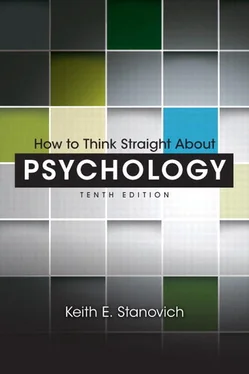It is easy to argue that there are really only two things that justify psychology as an independent discipline. The first is that psychology studies the full range of human and nonhuman behavior with the techniques of science. The second is that the applications that derive from this knowledge are scientifically based. Were this not true, there would be no reason for psychology to exist.
Psychology is different from other behavioral fields in that it attempts to give the public two guarantees. One is that the conclusions about behavior that it produces derive from scientific evidence. The second is that practical applications of psychology have been derived from and tested by scientific methods. Does psychology ever fall short of these goals? Yes, quite often (Lilienfeld, 2007; Lilienfeld, Ruscio, & Lynn, 2008). This book is about how we might better attain them. I will return in Chapter 12 to the issue of psychologists themselves undermining their own legitimacy by not meeting appropriate scientific standards. But, in principle, these are the standards that justify psychology as an independent field. If psychology ever decides that these goals are not worth pursuing—that it does not wish to adhere to scientific standards—then it might as well fold its tent and let its various concerns devolve to other disciplines because it would be a totally redundant field of intellectual inquiry.
Clearly, then, the first and most important step that anyone must take in understanding psychology is to realize that its defining feature is that it is the data-based scientific study of behavior. Comprehending all of the implications of this fact will occupy us for the rest of this book, because it is the primary way that we develop the ability to think straight about psychology. Conversely, the primary way that people get confused in their thinking about psychology is that they fail to realize that it is a scientific discipline. For example, it is quite common to hear people outside the discipline voice the opinion that psychology is not a science. Why is this a common occurrence?
Attempts to convince the public that psychology cannot be a science stem from a variety of sources. As will be discussed in later chapters, much confusion about the actual discipline of psychology is deliberately fostered by purveyors of bogus psychology. There has grown up in our society a considerable industry of pseudoscientific belief systems that have a vested interest in convincing the public that anything goes in psychology and that there are no rational criteria for evaluating psychological claims. This is the perfect atmosphere in which to market such offers as “Lose weight through hypnosis,” “Develop your hidden psychic powers,” and “Learn French while you sleep,” along with the many other parts of the multibillion-dollar self-help industry that either are not based on scientific evidence or, in many cases, are actually contradicted by much available evidence.
Another source of resistance to scientific psychology stems from the tendency to oppose the expansion of science into areas where unquestioned authorities and “common sense” have long reigned. History provides many examples of initial public resistance to the use of science rather than philosophical speculation, theological edict, or folk wisdom to explain the natural world. Each science has gone through a phase of resistance to its development. Learned contemporaries of Galileo refused to look into his new telescope because the existence of the moons of Jupiter would have violated their philosophical and theological beliefs. For centuries, the understanding of human anatomy progressed only haltingly because of lay and ecclesiastical prohibitions of the dissection of human cadavers (the Christian view was that the interior of the body was “God’s province”; see Grice, 2001). Charles Darwin was repeatedly denounced. Paul Broca’s Society of Anthropology was opposed in France in the nineteenth century because knowledge about human beings was thought to be subversive to the state.
Each scientific step to greater knowledge about human beings has evoked opposition. This opposition eventually dissipated, however, when people came to realize that science does not defile humanity by its investigations but contributes to human fulfillment by widening the sphere of knowledge. Who now believes that astronomy’s mapping of the galaxies and its intricate theories about the composition of distant stars destroy our wonder at the universe? Who would substitute the health care available in their community for that available before human cadavers were routinely dissected? An empirical attitude toward the stars or the human body has not diminished humanity. More recently, Darwin’s evolutionary synthesis laid the foundation for startling advances in genetics and biology. Nevertheless, as we get closer to the nature of human beings and their origins, vestiges of opposition remain. In the United States, some politicians continue to press for the teaching of creationism in the public schools, and surveys show that the scientific fact that humans evolved by natural selection is not accepted by a large portion of the U.S. (though not the European and Canadian) public (Barnes, Keilholtz, & Alberstadt, 2008; Frazier, 2009, 2010; Laden, 2008). If evolutionary biology, with its long and impressive record of scientific achievements, still engenders public opposition, is it any wonder that psychology, the most recent discipline to bring long-held beliefs about human beings under scientific scrutiny, currently provokes people to deny its validity?
In order to understand what psychology is, we must understand what science is. We can begin by dealing with what science is not. First, science is not defined by subject matter. Any aspect of the universe is fair game for the development of a scientific discipline, including all aspects of human behavior. We cannot divide the universe into “scientific” and “nonscientific” topics. Although strong forces throughout history have tried to place human beings outside the sphere of scientific investigation, they have been unsuccessful, as we shall see. The reactions against psychology as a scientific discipline probably represent the modern remnants of this ancient struggle.
Science is also not defined by the use of particular experimental apparatus. It is not the test tube, the computer, the electronic equipment, or the investigator’s white coat that defines science. These are the trappings of science but are not its defining features. Science is, rather, a way of thinking about and observing the universe that leads to a deep understanding of its workings.
In the remainder of this chapter, we shall discuss three important and interrelated features that define science: (1) the use of systematic empiricism; (2) the production of public knowledge; and (3) the examination of solvable problems. Although we shall examine each feature separately, remember that the three connect to form a coherent general structure. (For a more detailed discussion of the general characteristics of a science, see the works of Bronowski, Haack, Medawar, Popper, and Sagan listed in the references section of this book.)
If you look up the word empiricism in any dictionary, you will find that it means “the practice of relying on observation.” Scientists find out about the world by examining it. The fact that this point may seem obvious to you is an indication of the spread of the scientific attitude in the past couple of centuries. In the past, it has not always seemed so obvious. Recall the example of Galileo. With his primitive telescope, Galileo claimed to have seen moons around the planet Jupiter at a time when it was thought by learned people that there were only seven “heavenly bodies” (five planets, the sun, and the moon). This was at a time when it was thought that knowledge was best obtained through pure thought or through appeal to authority. Some contemporary scholars refused to look into Galileo’s telescope. Others said the telescope was designed to trick. Still others said that it worked on Earth but not in the sky (Shermer, 2011). Another scholar, Francesco Sizi, attempted to refute Galileo, not with observations, but with the following argument:
Читать дальше












